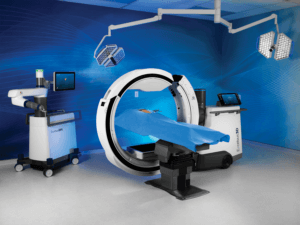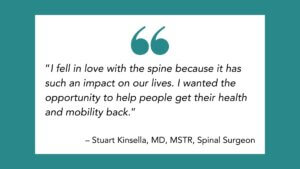News
The Surgeon’s Robot Will See You Now
Dr. Stuart Kinsella on the intersection of man and machine and the power that robotics has to transform lives.
Robotics is nothing new in the medical field. In fact, the PUMA 560, the first surgical robot, was introduced in the 1980s. But advancements in computing power, materials science and artificial intelligence have made it possible to create robots that are smarter, more capable and more versatile than ever before – with the improved outcomes and quality of life to match.
Spinal surgeon Stuart Kinsella, MD, MSTR, of The Steadman Clinic, is an expert in this field. He has performed more than 100 innovative and minimally invasive surgeries using screws, rods – and a robot – to stabilize the spine.
A Golden Age
The widespread use of instrumentation in spinal surgery prompted the need for better image guidance. Enter the Globus Excelsius GPS Robotic Navigation platform.
The “Globus Robot” or “Globot” for short, gives surgeons significantly improved visualization and precision through computer-assisted navigation. This is the strike point in complex surgery, allowing surgeons to achieve improved outcomes.
The robot is particularly helpful for spinal procedures like lumbar or thoracic fusions. These surgeries can help patients with degenerative instability, unstable fractures, scoliosis, stenosis and malignancy.

High Tech, High Touch
Here’s how it works … Before surgery, medical images of the patient’s spine are imported into the Globus Robot. Dr. Kinsella uses these images to determine the size and placement of the hardware and to create a specialized surgical plan based on each patient’s anatomy.
This roadmap guides the robotic arm to a specific region of the spine, like a predetermined route on a GPS. Simply put, Dr. Kinsella uses this pathway to accurately place the rods and screws.
“In real time, I can visualize the position of the proposed instrumentation,” Dr. Kinsella says. “The robot has an arm that guides the trajectory of the hardware based on the medical images – as well as the patient’s position on the operating room table.”
The Next Era of Spine Surgery
Bottom line: When skilled hands take hold of leading-edge technology, better patient outcomes are unlocked. These include:
- Unprecedented surgical precision
- Fewer imaging requirements resulting in reduced radiation exposure
- Less pain and faster recovery time due to smaller incisions and less damage to soft tissues
“This technology delivers the safest, most reliable results,” says Dr. Kinsella. “Using robotics and computer-assisted navigation, the Globus Robot allows me to place hardware with the highest level of accuracy. This is especially helpful in deformity cases and complex revisions where previous surgeries have been performed.”

Dr. Kinsella: The Backstory
 Originally from the Boston area, Stuart Kinsella, MD, MSTR, stayed close to home for college. He obtained his undergraduate degree in biology from Harvard University before obtaining his medical degree from the University of Pennsylvania, where he concurrently earned a masters in translational research. He returned to Boston for postgraduate training, and completed his internship, residency, and adult spine surgery fellowship at Harvard.
Originally from the Boston area, Stuart Kinsella, MD, MSTR, stayed close to home for college. He obtained his undergraduate degree in biology from Harvard University before obtaining his medical degree from the University of Pennsylvania, where he concurrently earned a masters in translational research. He returned to Boston for postgraduate training, and completed his internship, residency, and adult spine surgery fellowship at Harvard.
Dr. Kinsella spent the last few years in Vero Beach, Florida, with Vero Orthopaedics. Although he had a highly successful practice, the opportunity to join the world-class surgeons at The Steadman Clinic was one he couldn’t resist.
Dr. Kinsella is board certified in orthopaedic surgery. He specializes in open, minimally invasive, and robotic spine surgery. His approach to treatment? “Always deliver the care I would want for myself and my family,” he says.
A new member of our Roaring Fork Valley, he officially began seeing patients in May. He practices at both the Willits and Aspen locations of The Steadman Clinic and performs surgeries with the aid of the Globus Robot at Aspen Valley Hospital.


